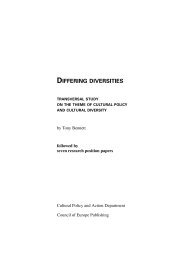Why we need European cultural policies: the impact of EU ...
Why we need European cultural policies: the impact of EU ...
Why we need European cultural policies: the impact of EU ...
You also want an ePaper? Increase the reach of your titles
YUMPU automatically turns print PDFs into web optimized ePapers that Google loves.
81 32001G0731(01) Council Resolution<strong>of</strong> 23 July 2001 on exchange <strong>of</strong> informationand experience concerning conditions forpr<strong>of</strong>essional artists in <strong>the</strong> context <strong>of</strong> <strong>EU</strong>enlargement.87 See <strong>European</strong> Forum for <strong>the</strong> Artsand Heritage (EFAH) and Interarts (2003)Report on <strong>the</strong> state <strong>of</strong> <strong>cultural</strong> cooperation inEurope, October.82 In this case, <strong>EU</strong> nationals – that isanyone holding an <strong>EU</strong> passport.83 According to <strong>the</strong> Compendium <strong>of</strong><strong>cultural</strong> <strong>policies</strong> and trends in Europe (2005),all countries <strong>we</strong>re revising <strong>the</strong>ir legislationregarding movable <strong>cultural</strong> goods during <strong>the</strong>period <strong>of</strong> negotiations.84 Establishment <strong>of</strong> <strong>the</strong> <strong>European</strong>observatory <strong>of</strong> <strong>cultural</strong> co-operation wasinitially proposed in <strong>the</strong> Ruffolo Report(Ruffolo 2001).85 A decision not to include copyrightin <strong>the</strong> questionnaire was taken because<strong>the</strong>re is enough information available aboutharmonization with <strong>the</strong> acquis communautaire.86 Analysis <strong>of</strong> <strong>the</strong> <strong>impact</strong> <strong>of</strong> <strong>the</strong> fundingprogrammes and Culture 2000 in particularwas done by <strong>the</strong> Commission, <strong>European</strong>Parliament, <strong>European</strong> networks (such asEFAH for example) as <strong>we</strong>ll as researchinstitutes and consulting companies. Muchinformation can be found at <strong>the</strong> <strong>we</strong>bsite <strong>of</strong> <strong>the</strong>Budapest Observatory (www.budobs.org).88 Estonia was an example: <strong>the</strong> CopyrightAct has been changed in 1992, 1996,1998, 1999, 2000 and 2001. This wasaccompanied by several amendments too<strong>the</strong>r laws, for instance, <strong>the</strong> criminal code,consumer protection (ERICarts/Council <strong>of</strong>Europe, 2005)89 Although most transition countriesopted for <strong>the</strong> continental model, (sometimesknown as droit d’auteur), at <strong>the</strong> same time<strong>the</strong>re is a clear conflict at <strong>the</strong> <strong>EU</strong> bet<strong>we</strong>entwo concepts – a) Anglo-American and b)continental or droit d’auteur – in which <strong>the</strong>Anglo-American tradition, strongly supportedby <strong>the</strong> interests <strong>of</strong> major media companiesseem to be gaining ground (Macmillan 2004).Macmillan cited <strong>the</strong> example <strong>of</strong> <strong>the</strong>Information Society Directive, which isextremely important for <strong>the</strong> future <strong>of</strong>so-called `content industries’, and is,according to Macmillan, firmly rooted in <strong>the</strong>Anglo-American tradition.90 <strong>European</strong> Economic Area (EEA): 25 <strong>EU</strong>Member States plus Liechtenstein, Icelandand Norway.91 The two most recent IPR public debatesinternationally have been about medicinesfor developing countries and piracy – <strong>the</strong>infringement <strong>of</strong> copyrights by unauthorizedNotes87














